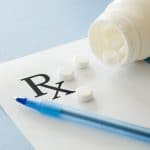A Halcion (triazolam) overdose can be caused by taking high amounts of this brand name benzodiazepine drug, or by mixing it with opioids. Symptoms of a Halcion overdose may include slurred speech, impairment, drowsiness, and respiratory depression.
Risk factors for a Halcion overdose include advanced age, taking Halcion with other drugs, and having a history of drug addiction.
On a per-dose basis, triazolam can be significantly more potent than other benzodiazepines such as diazepam and lorazepam. The U.S. Food and Drug Administration reports the overdose threshold of triazolam at 2 mg, which is four times the maximum recommended dose.
Causes Of A Triazolam Overdose
A triazolam overdose may be the result of a central nervous system shutdown.
Triazolam is a central nervous system depressant which slows brain activity. In recommended doses, Halcion can have a calming, sedative effect that has medical uses. In high doses, the central nervous system may be too slow to maintain vital bodily functions.
While other benzodiazepines can have high overdose thresholds, this may not apply to triazolam. Overdosing on Halcion alone may be more likely than overdosing on Valium or Xanax by themselves.
Triazolam Overdose Symptoms
Overdose symptoms of triazolam may include:
- severe drowsiness
- slurred speech
- loss of coordination
- respiratory depression (a state of slowed or stopped breathing)
- apnea
- coma
A triazolam overdose may occur after an overdose victim displays common side effects of the drug, such as headache, nervousness, and lightheadedness.
Triazolam Overdose Risk Factors
Certain age groups, health conditions, and prescription drugs may increase the chances of a Halcion overdose.
Age Groups
Older adults over the age of 65 may be more susceptible to a dose of Halcion compared to younger patients. Older patients may receive lower doses of Halcion in order to minimize their risk of serious side effects and drug overdose.
Drug Interactions
Opioids and benzodiazepines can have additive effects when taken together. Previously safe doses of either drug can cause life-threatening respiratory depression, as the overdose threshold of either drug may be lowered significantly.
Other drugs that may cause a drug overdose or overdose-like effects when mixed with Halcion include certain oral contraceptives, antidepressants, and isoniazid, an antibiotic. Grapefruit juice can also increase the potency of a dose of triazolam.
If you are taking prescription drugs, a discussion with your doctor can help you decide if you should take triazolam.
Substance Abuse
Abusing Halcion may increase your risk of an overdose. Halcion abuse may occur when you take the drug without a prescription, do not follow the prescription given by your doctor, or mix Halcion with other drugs.
In these instances, your Halcion dosage may be higher than the recommended dose, which can put you at or near the overdose threshold. Long-term drug abuse patterns may also lead to higher doses over time.
Triazolam Overdose Treatment
Immediate benzodiazepine overdose treatment may involve the use of flumazenil. Flumazenil is a benzodiazepine receptor antagonist that can reverse the depressive effects of an overdose and restore bodily functions.
Flumazenil may be given alongside respiratory and cardiovascular support. Other short-term treatment methods may include stomach pumping and the use of intravenous fluids. A triazolam overdose may be indicative of a long-term substance use disorder.
Patients who display withdrawal symptoms while hospitalized may be referred to a long-term treatment program to lower the risk of future overdoses.
For information on our outpatient treatment programs, please contact us today.
Written by
Northeast Addition Editorial Team
©2024 Northeast Addition Center | All Rights Reserved
This page does not provide medical advice.





